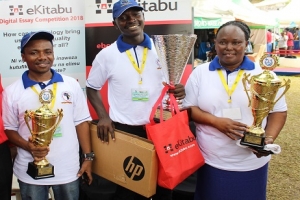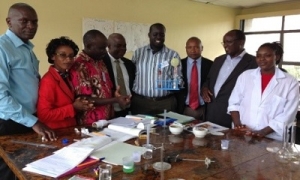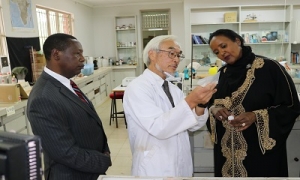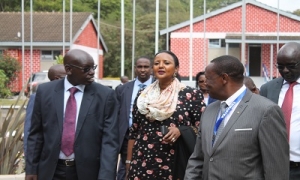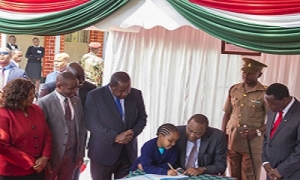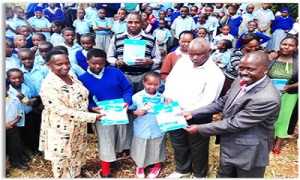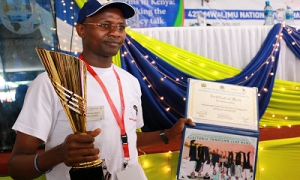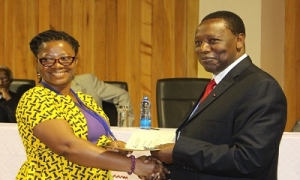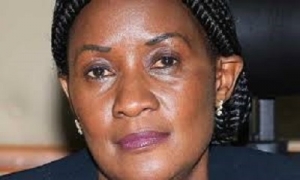CEMASTEA in conjunction with, e-Kitabu, TSC and KESSHA held its second iTOYA competition for the most innovative teacher who integrates ICT in teaching and learning with an aim of enhancing teacher professional development and technological pedagogical content knowledge. ICT Teacher of the Year Award (iTOYA) was held in Mombasa during the 43rd annual Kenya Secondary School Heads Association. The theme of the conference was “Re-directing the Education Sector in Kenya.” and ICT integration in teaching and learning. The eight finalists were drawn from the eight regions namely; Nairobi, Coast region, Eastern region, North-Eastern region, Western region, Rift valley region, Central region and Nyanza region.
The Eight Regional Finalists
From left: Fred Bongu (Coast) Jasper Sifuna(Western) Damaris Mwende (Eastern) Benard Omollo(Nyanza)
Maxwell Kayesi(Centra) Ali Mahat (North Eastern) Jane Sakwa (Nairobi) and Julius Munene(Rift Valley)
iTOYA competition was held at the national levels alongside Teacher of the Year Award (TOYA) and Principal of the Year Award (POYA). On day one, seven regional winners were subjected to an aptitude test and made presentations on the key milestones and initiatives that made them qualify at the regionals on the second day.
Mr. Benard Omollo (Nyanza Region) Ms. Damaris Mwende (Eastern Region)
Mr. Fred Bongu (Coast Region) Mr. Jasper Sifuna (Western Region)
The presentations were done concurrently with the TOYA and POYA which. The presentations attracted many teachers from all over Kenya and iTOYA regional winners got positive reactionsfor the good work they were doing to integrate ICT in their lessons. The nominees were also subjected to a face to face interview. Honorable Amos Kimunya, MP Kipipiri Constituency graced the occasion as the guest of honor during the awarding ceremony in the company of Chief Commercial Officer of Equity Bank Mr. Polycarp Igathe.
Honorable Amos Kimunya, MP Kipipiri Constituency Mr. Polycarp Igathe, Chief Commercial Officer; Equity Bank
The winner of the iTOYA was Mr.Maxwell Vincent Kayesi from Karuri Secondary Kiambu, Central region, who was awarded a laptop, a trophy and Kshs. 100,000, the first runners up was Ms. Mwende Kamoya from Mbooni Boys Makueni, Eastern region who was also awarded a laptop, a trophy and Ksh. 70,000 and finally for second runners up Mr. Fred Bongu from Coast Girls, Coast region who was awarded a laptop, a trophy and Kshs. 50,000. All the regional winners took home a Lenovo laptop, a gift bag and a regional trophy.
|
Winner
|
Name: Maxwell Vincent Kayesi School: Karuri Secondary Kiambu Region: Central |
|
1st Runners up
|
Name:Ms. Damaris Mwende Kamoya School: Mbooni Boys Makueni Region: Eastern |
|
2nd Runners up |
Name: Mr.Fred Bongu School: Coast Girls Mombasa Region: Coast |
The three finalists displaying their awards flanked by e-Kitabu, Director CEMASTEA and CEMASTEA staff
The regional finalists with Director CEMASTEA Mr. Stephen M. Njoroge- HSC.
This year, CEMASTEA intends to train a total of 8,013 mathematics and science teachers of teaching experience of 21 years and above drawn from 47 counties. The training will be on expectations of the ongoing school curriculum reforms that lay emphasis on making learners acquire competencies to fit in the 21st Century work environment. All the mathematics and science teachers from the ASAL areas will however be targeted.
The training is implemented in a cascade manner where 1,117 County trainers -Trainers of Trainers (TOTs) in mathematics and science education - are trained at the national level and then expected to train the 8,013 mathematics and science teachers in the various INSET centres at the County level during school holidays in 2018.
The teachers were taken through Inquiry Based Learning (IBL) using the 5E (engagement, exploration, explanation, elaboration and evaluation) instructional model. This is in-line with the on-going curriculum reforms that emphasizes on Competency based curriculum that Kenya Institute of Curriculum Development (KICD) has rolled out in the on-going curriculum reforms.
The secondary National INSET was conducted in two batches. Batch one, over the First term mid-term holiday, from 25th February to 2nd March 2018 and the 2nd Batch from Monday April 9 to 13th April 2018 in four centres; Nakuru at Jarika Hotel, Embu at Isack Wolton, Nyandarua at Tabor Hill Centre with CEMASTEA hosting the training for Nairobi County.
Participants in Embu were drawn from Murang’a, Kitui, Meru Nyandarua, Nakuru, Nyeri, TharakaNithi and Kajiado Counties.
Nakuru Centre hosted Mombasa, Vihiga, Makueni, Kisumu, Kisii, Elgeyo Marakwet, Narok,
Turkana, West Pokot, Nandi, Bomet and Trans Nzoia Counties
Nyandarua hosted Uasin Gishu, Samburu, Kiambu, Baringo, Nairobi, Machakos, Kirinyaga Embu, Laikipia and Kericho
CEMASTEA hosted Siaya, Kakamega, Nyamira, Marsabit, Bungoma, Kilifi, Homa Bay, Mandera, Lamu, Isiolo, Busia, Migori, Garissa, Kwale, Wajir, Tana River and TaitaTaveta Counties.

Mr. Stephen Njoroge-HSC, Director CEMASTEA,
During the opening ceremony of Secondary National INSET Batch 2 at CEMASTEA


Director of Special Education, Ms Maria Cherono, Dr. Darius Mutisya, Director, Quality Assurance and Standards
making her remarks at Tubor Hill Center , Nyandarua at Jarika Hotel, Nakuru County
The participants were urged to allow learners experience Maths and Science while teaching for this would promote critical thinking, enhance communication & collaboration skills, creation of new innovations and to continue upgrading their pedagogical content knowledge in order to be in tandem with the ever changing needs of learners in the 21st Century.

Mr. Stephen Njoroge-HSC, the Director CEMASTEA (seated-centre) with some of the participants and trainers


Participants and CEMASTEA trainers during different sessions of the training


Prof Malonza (Board Member, CEMASTEA) and Dr Mutuku (Kenyatta University) monitoring the National INSET)
The one – week training was successfully completed on Friday April 13, 2018 with the
TSC Chief Executive Nancy Macharia saying that under the new guidelines, teachers in all schools and tertiary colleges will be trained in line with global trends in Teacher Professional Development (TPD). In speeches read by TSC officials officiating on behalf of the TSC boss, Assistant Deputy Directors at TSC, Charles Kimwomi in Embu, and Madam Regina A. Opondo, in Nakuru, informed the participants that the training is in line with the Teachers Service Commission (TSC)-Teacher Professional Development (TPD) programme launched on 16th April 2018
She exuded confidence that teachers would demonstrate understanding of the broad 21st Century student’s outcomes and support systems by the end of the five day course. “You are expected to provide learners with a variety of information resources and technological tools to mediate learning,” she told the teachers. “Back in your schools, you should be able to organize content into an effective learning and teaching progression.”She urged experienced teachers who had undergone refresher courses such as the one facilitated by CEMASTEA in different regions to mentor new entrants.“We count on you to revolutionize learning in our schools, “she said.


Ass. Deputy Director at TSC, Charles Kimwomi Ass. Deputy Director at TSC, Regina A.Opondo
Mr. Milton Moka, Director Early Childhood and Teacher Training, MoE, represented by Ms. Margaret Gittiya, Senior Assistant Director of Education (Right) while speaking to the participants during the closing ceremony of SMASE Secondary National Inset, Batch two at CEMASTEA, noted that the trainings are aimed at achieving Vision 2030. She encouraged the participants to take seriously what they have learnt since it would only make sense if they are able to practice it. Ms. Gittiya, while speaking said that it was great to see the participants complete their training and were now able to cascade it. She noted that the 21st Century teacher should be a technological master, collaborative, adaptive, a long life learner and be able to advocate for their profession since the goal of the teacher is to impart knowledge.
She mentioned on behalf of Mr. Moka that; “New ways of work, communication, doing business, conducting social relations and so on are quickly emerging. All these transformations are being facilitated by Science, Technology and Innovation (ST&I) whose building blocks are basic Science and Mathematics”.
The participants were reminded of the greater chance they are having of revolutionizing teaching in schools. “Our expectation is that you will mentor the new entrants in the profession into great teachers who are able to inspire learners into innovators”, said Ms. Gittiya


Ms.Margaret Gittiya, Participants during the SMASE Secondary National Inset 2018-Batch 2,
Senior Assistant Director of Education closing ceremony at Sugiyama hall CEMASTEA
Certificates of participation were awarded to the participants after successfully completing the training she urged them to do their best in the various schools.



Participant are awarded with certificates after successfully completing the one-week training at CEMASTEA
cultural night
During INSET, a cultural evening is held to accord participants the opportunity to show case their culture through dances and artefacts aimed at enhancing national cohesion where different communities appreciate each other’s cultures. Each Centre during the 2018 National INSET held a cultural evening.
At CEMASTEA, the cohort’s president, Mr. Ikapel Corns Pius emphasised that the eighth cohort was unique owing the participant’s cultural diversity having been drawn from predominantly border counties. He said that the cultural night was interesting and participants learnt that the blend of the diverse Kenyan cultures if appreciated would lead to respect for one another in unity, integration and cohesion.


Participants presenting during the cultural night
article written by Winfred/CEMASTEA
During her first official visit to the Centre for Mathematics, Science and Technology Education in Africa (CEMASTEA), the Cabinet Secretary for Education Amb. (Dr.) Amina Mohammed, CBS, CAV, EGH congratulated CEMASTEA for the excellent work. She promised that the Ministry of Education wouldsupport the training programmes offered by the Centre.

Amb. (Dr.) Amina Mohammed, EGH, CAV signing the visitor’s book at CEMASTEA)
[Photo: Dan Orero/CEMASTEA]
She recapitulated that CEMASTEA training programmes being primarily on Mathematics, Science and Technology are in line with the government’s commitment to promote innovativeness, effectiveness, creativity and technology transfer which is supported by the constitution, the National Education Sector Plan of 2014-2018 and the Sessional Paper No. 2 of 2016, the Basic Education Act 2013, Science, Technology & Innovation Act 2013 and Vison 2030. The training programmes will promote Teacher Professional Development and improve skills of Mathematics and Science Teachers

Amb. (Dr.) Amina Mohammed, EGH, CAVwatering an Elgon Teak tree she planted during her official visit to CEMASTEA
[Photo: Dan Orero/CEMASTEA]
She stated that teachers need to go beyond the mere transfer of knowledge and instead equip learners with problem solving, creative and collaborative skills which will establish a connection between school work, work place, community and the global economy.

The CS, MoE and the Director CEMASTEA being taken through a demonstration by Prof. Ishikawa at the Innovations Lab-CEMASTEA
[Photo: Dan Orero/CEMASTEA]
She was impressed with the exhibitions and innovations that the students showcased during her visit and confirmedthat the focus on STEM education is beginning to bear fruits.

The CS MoE, Director CEMASTEA and the CEMASTEA staff being taken through a robotic demonstration by students from Jamhuri High School
[Photo: Dan Orero/CEMASTEA]
She remarked that the need to commercialize these innovations would create job opportunities and there is a need to match the innovations with what the job market requires.

Amb. (Dr.) Amina Mohammed, EGH, CAV speaking during her visit to CEMASTEA
[Photo: Dan Orero/CEMASTEA]

The CS MoE receives a crate of bottled water distilled by students from St. Albert’s Ulanda Girls’ High school following the STEM trainings by CEMASTEA
[Photo: Dan Orero/CEMASTEA]
She challenged the teachers, students and stakeholders to positively take the STEM programmes offered by the Centre.

Amb. (Dr.) Amina Mohammed, EGH, CAV (centre) poses for a group photo with students and teachers from Olekajuado High School
[Photo: Dan Orero/CEMASTEA]

Amb. (Dr.) Amina Mohammed, EGH, CAV (centre) poses for a group photo with students and teachers from St. Alberts Girls UlandaHigh School
[Photo: Dan Orero/CEMASTEA]

Amb. (Dr.) Amina Mohammed, EGH, CAV (centre) poses for a group photo with students and teachers from St Mary’s Ngarariga High School
[Photo: Dan Orero/CEMASTEA]

Amb. (Dr.) Amina Mohammed, EGH, CAV (centre) poses for a group photo with students and a teacher from Jamhuri High School
[Photo: Dan Orero/CEMASTEA]

Amb. (Dr.) Amina Mohammed, EGH, CAV (centre) poses for a group photo with students from Buru Buru Girls High School
[Photo: Dan Orero/CEMASTEA]

Amb. (Dr.) Amina Mohammed, EGH, CAV (centre) poses for a group photo with CEMASTEA staff
[Photo: Dan Orero/CEMASTEA]
Centre for Mathematics, Science Technology Education in Africa (CEMASTEA) is today honoured to host on behalf of the Ministry of Education, the CS Education Amb. (Dr) Amina Mohammed. E.G.H, CAV. The meeting was an extensive briefing session where she was taken through the policies, programs and initiatives the ministry is undertaking.

Mr. Stephen Njoroge, HSC, Director CEMASTEA welcomes Amb. (Dr.) Amina Mohammed, EGH, CAV for a meeting at CEMASTEA, Karen

Amb. (Dr.) Amina Mohammed, EGH, CAV signing the visitors book at CEMASTEA

Left Dr. Belio Kipsang MOE, Amb. (Dr.) Amina Mohammed, EGH, CAV and Mr. Stephen Njoroge, HSC, Director CEMASTEA at CEMASTEA, Karen

Seated from (far Left) Mr. Simon Kavisi, Deputy Commission Secretary, (TSC) (2nd left) Mr. Stephen Njoroge, Director, CEMASTEA, (3rd Left) Dr. Belio Kipsang PS Basic Education, Amb. (Dr.) Amina Mohammed, EGH, CAV, Hon. Kachapin, Chief Administrative Secretary, Prof Japheth Ntiba PS University Education and Research (standing) members of staff from state department of early learning and basic education at CEMASTEA, Karen
On Friday January 5, 2018, Centre for Mathematics, Science and Technology Education in Africa (CEMASTEA) was honoured to host His Excellency Hon. Uhuru Kenyatta, CGH, President and Commander in Chief of the Defense Forces of the Republic of Kenya as he presided over the Commissioning of Core Course Books for Secondary schools. The function was spearheaded by the Ministry of Education.

His Excellency the President Uhuru Kenyatta guides Domita Nyambura, a pupil from Karen C Primary to sign the visitor’s book at CEMASTEA Karen
Prof. Colletta A. Suda(left) CBS, Principal Secretary, State Department for University Education, Mr. Joe Mucheru (second left) CS Information, Communication and Technology (ICT), Dr Belio Kipsang, Principal Secretary Ministry of Education, Dr. Fred Matiang’i Cabinet Secretary Ministry of Education and (far right) Mr. Stephen M. Njoroge, HSC Director CEMASTEA

His Excellency the President Uhuru Kenyatta, seated with from left: Dr. Diana Mwinzi, Principal Secretary Vocational & Technical Training, Prof. Colletta A. Suda, CBS, Principal Secretary, State Department for University Education, Dr. Fred Matiang’i, CS, Ministry of Education, Mr. Joe Mucheru, CS Information, Communication and Technology (ICT), Dr. Richard Belio Kipsang’, Principal Secretary Ministry of Education, Science and Technology during the textbooks launch at CEMASTEA, Karen

His Excellency the President Uhuru Kenyatta sharing a light moment with Mr. Wilson Sossion KNUT Secretary General, Prof. George Magoha, Chairperson KNEC and Dr. Fred Matiang’i, Cabinet Secretary Ministry of Education during the launch of textbooks at CEMASTEA Karen

His Excellency the President Uhuru Kenyatta flagging off the textbooks during the launch at CEMASTEA, Karen

His Excellency the President Uhuru Kenyatta handing over textbooks to pupils from Karen C Primary School during the launch at CEMASTEA, Karen
Pupils drawn from Kanjora Primary School, D.E.B Kahiga-ini Primary School, Karuna-ini Primary School and Gathathi-Ini Primary School in Nyeri County got a warm treat from the five member team from CEMASTEA when they visited their schools to donate books on peace education. Peace Education was the theme for the Corporate Social Responsibility (CSR) held from Thursday January 18, 2018 to Friday January 19, 2018.
Led by Mrs. Beatrice Macharia, the Deputy Coordinator Training, CEMASTEA and Mr. Philip Maate, the Deputy Dean Physics Education department, CEMASTEA; the team spent the two days interacting and engaging the pupils, parents and teachers in educational and motivational talks before awarding the pupils with the Peace Education story books including the teachers’ guide which were donated by the Ministry of Education (MoE) through Mrs. Macharia’s initiative and the Communication Department of CEMASTEA with the great support from the Director CEMASTEA, Mr. Stephen M. Njoroge, HSC.

CEMASTEA Book Donation: Pupils from Karuna-ini Primary School and their teachers receiving books from Mrs. Beatrice Macharia-Deputy Cordinator, TrainingCEMASTEA (left) and Mr. Philip Maate, Deputy Dean Physics CEMASTEA (right)[Photo: Charles Karani]
The aim for donating the books was to sensitize the pupils, teachers and the parents on the importance of Peace Education that has also been incorporated in the new curriculum.
Speaking to the parents, Mrs. Macharia emphasized that the home environment affects the school environment, therefore there is need to create a good environment for the children at home since this will see them through their other learning environments. She encouraged the teachers to be more innovative in teaching and learning to ensure that the performance is improved.

Teachers from D.E.B Kahiga-ini Primary school in Nyeri County receiving guidance for ‘Teacher Activity Book’ on Peace Education from Mrs. Beatrice Macharia (right) and Mr. Philip Maate (left) during the book donation by CEMASTEA. [Photo: Charles Karani]
On the other hand, Mr. Maate encouraged both the teachers and the parents on the importance of team work. He also gave them an illustration paraphrasing it from the bible in Colossians 3:23 on the need to take responsibility.
The pupils were encouraged to work hard in their studies and not to indulge in behaviours that will lead them into bad habits like drug abuse. They were also told to embrace peace in their lives and learning.
The CSR is among the activities and projects lined up in the CEMASTEA Calendar this year.
Dan Orero/CEMASTEA
This email address is being protected from spambots. You need JavaScript enabled to view it.
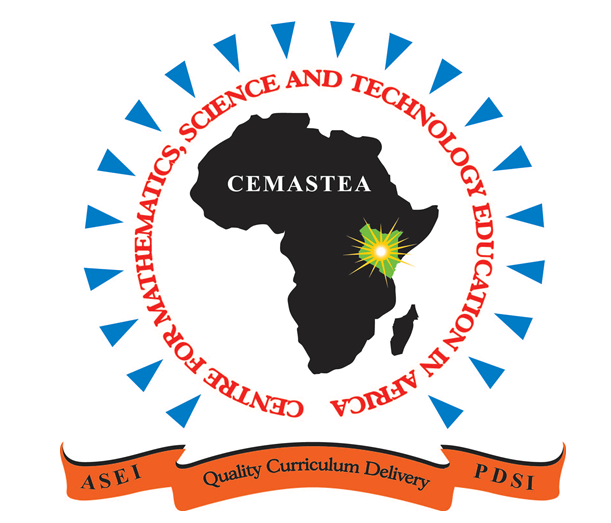
Centre for Mathematics, Science and Technology Education in Africa (CEMASTEA)
TEACHING AND LEARNING DURING COVID-19 PANDEMIC: INSIGHTS FROM SELECTED MATHEMATICS AND SCIENCE TEACHERS IN KENYA
COVID-19 pandemic has had devastating effects on all spheres of life and the education sector has not been spared. The disease was first reported in China in December 2019. By January 2020, it had become clear that COVID-19 was raising health concerns including the fact that it was highly contagious with a potential to cause death for some of the infected persons. Thus, the World Health Organisation (WHO) asked countries to take precautionary measures to ensure containment of the disease. The first case of COVID-19 was reported in Kenya on 13th March 2020 and two days later the President directed all learning institutions to close as a containment measure to curb the spread of the disease. Even though the closure of schools did not mean the end of education, it temporarily halted the face-to-face interactions between teachers and students.
To ensure continuity of learning following the schools closure, the Ministry of education (MOE) drafted the Kenya basic Education COVID-19 Emergency Response Plan (MOE, 2020), to guide the process. For example, through the plan, the MOE committed to strengthen the Kenya Education Cloud at the Kenya Institute of Curriculum Development (KICD) to ensure easy access to digital content by teachers and students. The MOE also tasked KICD to ensure provision of Radio and TV broadcasts on a timely and predictable manner including broadcasting through community radio channels. However, it was not clear how teachers would navigate the process of supporting learning through remote means as well as the kind of support they needed to be effective and successful in their work. This concern arose from the fact that up until the emergence of COVID-19 pandemic most of the teaching had been face-to-face.
This study which involved 472 SMASE Secondary school county trainers and 3718 secondary school mathematics and science teachers trained through CEMASTEA in 2020 was conducted to give insights into this issue. The study sought to (1) identify ways in which COVID-19 affected teaching and learning in secondary mathematics and science in Kenya (2) determine mathematics and science teachers’ perspectives about online teaching and learning (3) determine the ICT tools and platforms, sources of information, and support that enabled mathematics and science teachers to continue supporting learners during the COVID-19 pandemic (4) identify areas of capacity development for mathematics and science teachers to continue teaching during COVID-19 pandemic. To address these objectives the study adopted a descriptive survey methodology and utilised questionnaires to collects data.
The findings of this study show that teaching and learning was affected in three main ways as follows (1) disruption to teaching and learning (2) shift from face-to-face to remote teaching and learning, and (3) disruption to activities related to teaching and learning. As far as disruption to teaching and learning was concerned, the respondents noted that face-to-face interactions with student were not possible as a result of COVID-19 pandemic. They were concerned about students missing such interactions with the concern being greater for the Form Four students because of being in a candidate class and therefore expected to sit KCSE later in the year. It also emerged that despite this concern for students missing such interactions, majority of the respondents took more than four weeks to reach out to support students’ learning.
Indeed only about 40% of the respondents took the steps to reach out to students and support their learning utilising mainly telephone and specifically WhatsApp. The low percentage of respondents who made an attempt to reach out to students could be attributed to their perception about remote teaching and learning where majority of them did not believe that there could be effective teaching and learning through online platforms. This study also revealed that a teacher’s confidence to enact teaching through online platforms is a factor that affects whether or not a teacher engages students to learn through online platforms. The Multiple Logistic Regression Model applied in this study showed that respondents who were somehow confident or not confident at all to conduct teaching through online platforms had a relatively high likelihood of not conducting lessons during the pandemic period compared to those who were confident.
It also emerged that COVID-19 disrupted the routine of activities related to teaching and learning in terms of time spent on these activities. On average, between 43% and 45% of respondents spent less than two hours on teaching and other activities related to teaching such as planning lessons; reviewing lesson notes; assessing students’ learning and revising work already covered with students.
Regarding ICT tools, it emerged that the respondents were aware of a variety of ICT tools that could be deployed to support students’ learning during COVID-19 pandemic. The tools include hardware such laptops, mobile phones, CD-ROMs, Television, radio as well as platforms such as Google Classroom, WhatsApp, Facebook and sources of e-content form the internet through search engines such as Google, Firefox and Microsoft Edge. Despite, this high extent of awareness, the respondents’ deployment of these tools in supporting learning during COVID-19 was low for all the tools except WhatsApp which had the highest reported incidents of use. Internet connectivity (both in terms of cost and coverage) was the single factor cited most by respondents as a hindrance to the deployment of the tools to support students’ learning during COVID-19 pandemic.
All in all, the respondents acknowledged receiving support from several stakeholders aimed at continuity of learning during COVID-19 pandemic. The stakeholders who played a key role in this process included the MOE, Ministry of Health, TSC, KICD, CEMASTEA, school administration and County Governments. The support provided ranged from provision of information about COVID-19 (i.e., the need to keep and stay safe), and payment of salaries to capacity development in the use of some of the learning management systems (LMS), and provision of e-learning materials and internet bundles to access the materials.
This study concludes that, only a limited number of mathematics and science teachers reached out to their students to support their learning during COVID-19 pandemic. This was mainly due to barrier of accessibility and cost of ICT tools on the part of students. But also, the teachers’ perception about remote learning and their confidence to enact teaching through online platforms played a role in this. The study recommends that there should be sustained teacher professional development especially in the area of remote or online teaching and learning to equip the teachers with the requisite skills to support learners during circumstances that lead to prolonged school closures. Furthermore, ICT tools that include devices such as such as Smart phones, tablets, laptops, radio, TV and internet sets as well as electricity are enablers of remote or online learning. These resources need to be made available to all teachers and students to enable implementation of remote or online learning. This can only happen through a concerted effort of all stakeholders (i.e.,, BOM, school administration, and parents) including multi-agency support through various ministries such as MOE, ICT and energy. Specifically parents on their part are required to provide ICT tools and related resources such as internet bundles to ensure continuity of learning in circumstances leading to prolonged school closures. But more importantly, the role of parents in home schooling needs to be explored given the need for them to play a role also in guiding and supporting their children to gain meaningfully from the experiences of remote or online learning.
Congratulations to Mr. Paul Kamau Thairu; i -TOYA winner following his HSC award (Civilian Division) by His Excellency President Uhuru Kenyatta.
i -TOYA competition 2017 was a collaboration between CEMASTEA,TSC, eKitabu and KESSHA.
Education: City- based Centre boosting science teaching in Africa
By: Joe Ombuor
October 32017
Nairobi- based Centre for Mathematics, Science and Technology in Africa has trained hundreds of science, technology, engineering and mathematics teachers from across the continent the institution’s Director Mr Stephen Njoroge has said.
He said the skills acquired had trickled down to thousands of others and their students as those trained become trainer of their colleagues with the end result of improved performance.
The director spoke when he presented certificates to 43 participants from seven African countries at the end of a two- week training session organized together with Kenya’s Ministry of Education and the Japan International Co-operation Agency.

Mr. Stephen Njoroge (right)Director, Centre for Mathematics, Science and Technology Education in Africa, presents a certificate to a participant. [Dan Orero/CEMASTEA]
By: OumaWanzala
September 24 2017
The Teachers Service Commission has said there is need for regular training of practicing teachers in Kenya and other countries in the region.
TSC chief executive Nancy Macharia, said this will enable teachers to continuously equip themselves with opportunities to update and improve their knowledge and teaching techniques.
“This will greatly impact how they deliver lessons and effectively offer and education that is not only relevant but focused on real world problems,” said Mrs. Macharia
Ms. Macharia made the remarks at the Centre for Mathematics, Science and Technology Education in Africa during a training of mathematics and science teachers from seven African countries in the region on in Nairobi.
The two-week training will end next week. “I am delighted therefore to see continental efforts being made to improve the professional practice of teachers that will enhance the quality of education and learner achievement, “added Ms. Macharia.
Mrs. Macharia said the in-service education and training will increase teachers ‘capacity for a deeper understanding of the continent, how students learn and a broaden comprehension of clear- cut teaching skills and strategies that ultimately result in student learning.
Association for the Development of Education in Africa senior Finance and budget office Foday Kargbo underscored the role of governments and development partners in achieving both continental blue prints and global agenda
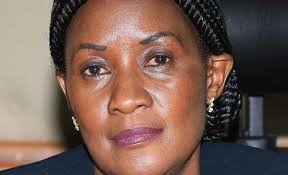
Mrs. Nancy Macharia, CEO Teachers Service Commission.[File]

